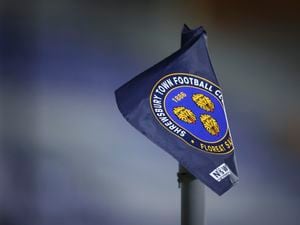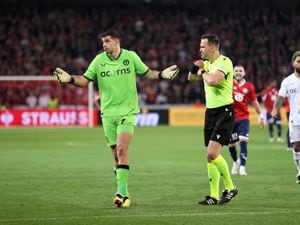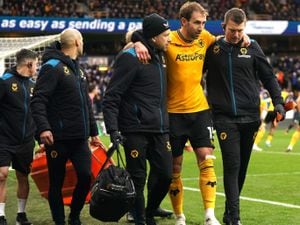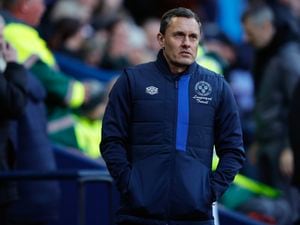Sky Sports' Johnny Phillips: Twitter talk bad for football
Where do you start with this, the direction this is all heading in?
Crystal Palace sacked Frank de Boer after four games in charge.
The final straw was a 1-0 defeat to Burnley, a game that they had 23 shots in.
Palace were the better team, but an individual error cost them dearly.
What made de Boer the right man for the job on August 16 but the wrong man on September 11?
It is an alarming turn of events. True, it was a terrible start to the season, but there are 102 points left to compete for.
Palace haven’t got a Plan B either as Sam Allarydce confirmed when he was a guest on Sky’s Monday Night Football. The former England manager admitted he received a call from Palace chairman Steve Parish asking if he was interested in getting is old job back.
Palace may have stumbled on the answer with Roy Hodgson – although his recent work has been far from impressive – and their season may yet be salvaged, but it says a lot about the ownership.
Parish was conveying his thoughts via Twitter after the weekend, very much in the way Dr Tony Xia was doing after Villa’s goalless draw with Brentford.
Are these owners essentially fans in suits with as much, or less, idea as the rest of us when it comes to running a club?
Last season Xia sacked Roberto Di Matteo after just 124 days in charge.
It was a poor decision then and it doesn’t look any better now.
Di Matteo is probably better off out of it though.
His successor Steve Bruce will have been told of Xia’s emojis tweet last Saturday evening:
“Sad face, surprised face, angry face.”
What sort of communication is this from the owner of one of England’s greatest football clubs? What does Xia hope to achieve?
If he genuinely wants the best for his football club then how on earth is a tweet of reactionary emojis that in turn generates an eruption of noise from disgruntled supporters possibly going to assist a promotion push?
Or was it simply narcissism masquerading as accountability?
‘Hey fans, I’m as frustrated as you are but as you can see it’s not my fault, I’m just sat in the stands. Please like, retweet or reply to agree it’s not my fault.’
This surely has to stop, it is a million miles away from constructive engagement.
Has the social media revolution made it harder for managers? Undoubtedly.
It is hard enough for under pressure managers to contend with irate supporters waving a smartphone around, but now there are owners in the game who are no better.
When Xia pressed send on that ill-conceived tweet, he did nothing to improve the club’s fortunes.
Whatever your opinions of Villa’s current form, Bruce deserves better.
At the start of the 2001/02 season, Middlesbrough manager Steve McClaren lost his opening four Premier League games.
His chairman Steve Gibson reacted with consideration and calmness. McClaren was kept on and two seasons later the club won their first ever major trophy, the League Cup.
They qualified for Europe on more than one occasion too and reached the 2006 UEFA Cup final.
This was the most successful period in the club’s history.
But had Gibson applied Parish’s logic, it may never have happened.
There are reports emerging of discontent behind the scenes at Selhurst Park.
A players’ revolt is supposed to have sparked De Boer’s downfall. Popular long-serving players have been sidelined and the manager has been cold in his dealings with them.
It always irks when stories of player unrest emerges.
A manager needs the best players, not the most popular ones.
This new project needed time before any lasting judgements could be made.
The appointment of De Boer signalled a change of direction, completely different from the LMA boy band of Tony Pulis, Neil Warnock, Alan Pardew and Sam Allardyce, who went before him.
Perhaps the De Boer experiment would never have worked, so Parish deserves credit for admitting his error early.
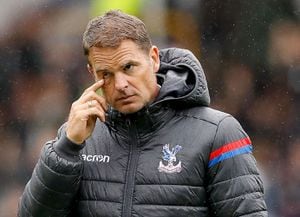
But a huge mistake has been made – either in appointing or sacking the Dutchman – and aside from the millions of pounds paid out in compensation to terminate his contract there is collateral damage to the club’s reputation.
It is unlikely that we will ever return to the days of managers being given a decent period of time at the helm while their owners keep their noses out of team affairs.
With this in mind, it is worth noting Watford’s approach to 21st century management.
Chief executive Scott Duxberry admits that his club is comfortable dispensing with managers on a regular basis, but takes a more organic approach to the club’s structure.
Watford is a club built from the bottom up, so that when the head is lopped off it doesn’t stop growth from below.
The coaching and management structures are in place and will not change when the head coach leaves.
Remember, this is a club that went through four managers in the season they won promotion to the Premier League.
And since then Quique Sanchez Flores, Walter Mazzarri and Marco Silva have all taken the job.
Duxberry believes that dispensing with a manager in such a model will not cause massive disruption.
So far it is hard to argue with that approach as the club continues to establish itself in the Premier League, but only time will tell if it proves a long-term success.
The pressures to reach and stay in the Premier League become greater each season.
As important as having the right man in charge of the team, is having the right men in the boardroom.
Recent events have suggested that some owners may need to look harder at their own roles in a club’s fortunes before taking their frustrations out on others.

